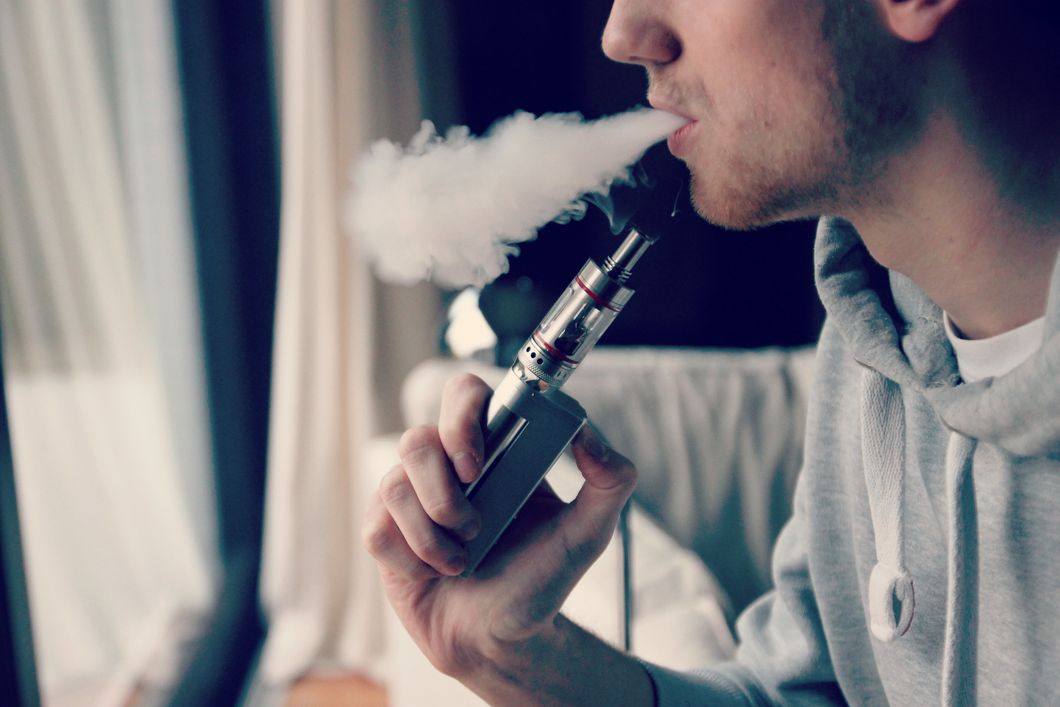Over the past few years, many people I know have tried vaping. Coworkers, classmates, friends—it seems like vaping is spreading everywhere. It's the latest trend: all the nicotine buzz of smoking without the cancer, right? Who could have a problem with teenagers having fun and filling their car with cotton candy flavored clouds?
Call me a killjoy, but I never hopped on that train. Vaping never seemed super appealing to me, not least because "e-cigarettes" has a bad connotation in my head. I grew up with the scary commercials about the dangers of smoking and knew people whose family members had gotten lung cancer from smoking. Why would you want to get within twenty feet of a cigarette, even if it was an electronic one?
Of course, the point of an e-cig is that it's smoking without the cancer, and vaping adds a lot more to it, according to my vaping friends: flavors, reusability, customizability. However, I still have my doubts that it's actually as good and harmless as some would claim.
1. It's trashy.

I'll admit that this is a personal opinion. To me, though, vaping is just trashy. Don't get me wrong, people who use vaping as a way to quit smoking are not trashy at all! They're doing great, and I'm glad they have this alternative available to them. And on that note, the point of this article is to show the problems with people who vape recreationally, not people who vape to quit smoking!
The thing is people who vape just to do it seem trashy. We all know these people, the ones who hang out in the parking lot or outside the building and blow clouds into everyone's faces, just to let people know they're cool, they vape. The ones who make your car feel moist and gross after they've been in it because they're so used to hotboxing their own that they want to vape in yours. It's trashy.
2. It's illegal for minors to have a vape.

Though laws about minors and vaping differ from state to state, most do identify vapes as tobacco products, whether they contain nicotine or not. Because of this, it is illegal in most states for minors (under the age of 21 in some places) to vape. Regardless of that, all states have laws against minors buying vapes, and it's also illegal for older friends to supply minors with vapes.
Minors who want to vape should really step back and ask themselves why. Vaping began as an alternative to smoking, a way for smokers to quit that habit. Teenagers who vape are rarely trying to quit smoking, but simply see it as a new form of smoking, a new way to make themselves cool. Is this the right attitude to have? Better than smoking doesn't necessarily mean harmless.
3. Just because it's less dangerous than smoking doesn't mean it's safe.

That's like saying that playing in the street in a neighborhood isn't as dangerous as playing on a freeway, so it's perfectly fine for the kids to go play in the street in front of their house. We automatically recognize the problem with this scenario: fewer cars on the road doesn't mean no cars, and it's better to not play in the street at all.
"Oh, but that's a dumb example!" you say. "Vaping is safe!" Is it, though?
Most vapers use juices that contain nicotine. As you all probably know, nicotine is a drug, and just because it's not illegal doesn't mean it's not powerfully habit-forming. There's a study from 2013 that even suggests inhaling nicotine, either firsthand or secondhand, could contribute to heart disease.
Another thing to consider is that there aren't a lot of federal regulations over what can be put in vape juice. Brands have the power to misrepresent their ingredients because there isn't any standard of quality control. Many juices also contain things that are probable carcinogens, such as formaldehyde and acetaldehyde.
The flavorings can also be iffy. A lot of them are flavorings that are used to flavor food. That puts a lot of vapers at ease. When we eat these flavorings, they are safe. However, we don't know the whole story of what happens when we inhale them, especially in large amounts over a large period of time. This is a largely neglected problem among the vaping community, actually: we don't actually know the effects of these substances when they are inhaled, which brings me to my next point.
4. There are NO long-term studies on the effects of vaping.

This is because it's such a new thing, of course. It's hard to have long-term studies on something that was only really created in the mid-2000s. Vaping itself only became popular in the past decade. We honestly have no idea how it will affect people over the course of many years as we do for other things. It's hard to draw conclusive evidence about long-term effects from only ten years of study. Remember, people used to think smoking was okay.
Actually, it turns out I was wrong. In researching this for this article, I found a study that isn't focused solely on vaping (it's about e-cigs as a whole), but it is related and important. Back in February of this year, scientists found the first evidence that e-cigs can contribute to long-term health damage. According to the study, "Daily use of electronic cigarettes is associated with nearly doubling the odds of a heart attack." That's kind of scary, isn't it?
5. It's addictive.

One thing that my vaping friends always say that has bothered me is that vaping isn't addictive. The thing is, it is. If a person uses a juice that contains nicotine, they can form an addiction to vaping as easily as they can to cigarettes. And the thing is, nicotine is not good for you. It can cause heart problems, as I mentioned above, as well as asthma attacks and other respiratory problems.
Even without nicotine, though, the habit of vaping is addictive. Psychological dependency is hard to overcome. Habits are very difficult to break, especially ones that give the brain pleasure. Even at trace amounts of nicotine, or none at all, vaping gives users a dopamine high.
If none of that convinced you, consider this: vaping is clearly addictive because stopping cold turkey gives people withdrawals. I know this first hand, as I watched one of my friends go through this. Withdrawal symptoms, such as insomnia, fatigue, anxiety, depression, and irritability are common among those who try to quit vaping.
A quick note on juuling.

I've been focusing on vaping in general here, but Juuling has become incredibly popular recently and I couldn't leave it unmentioned. The thing is, Juul pods generally contain double the nicotine as a regular vape does. This isn't something that's widely known; in fact, according to one study, 60% of kids who Juul believe that it is nicotine free. This is worrying because addictions are easier to form and harder to overcome for developing brains. Nicotine exposure at a young age can even cause brain remodeling. Stay off the Juuls, kids.
Vaping is not as safe and fun as it is advertised to be. Besides the fact that it is completely unregulated and there are no long-term studies on the effects, it causes addictions. And allowing yourself to form an addiction to anything is giving that thing control over your life, whether it be caffeine or cocaine. Think long and hard about whether vaping and nicotine is something you want to have control over your life before you pick up the pod.
















